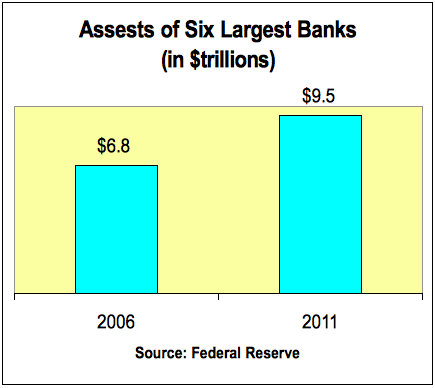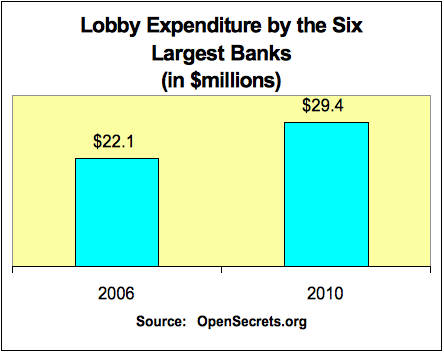(11 am. – promoted by ek hornbeck)
For four years, since the start of the financial crisis, people have been asking the question, “Why is the economy so sluggish?”
There are all sorts of reasons, all sorts of reforms that could be implemented, but weren’t. However, one of the most important reasons seems to have been forgotten by almost everyone.
The experts keep telling us not to worry because “America has the most dynamic economy in the world.” Roughly translated, that means “Companies can lay off people at will.”
Those experts have forgotten that there are two factors in a “dynamic economy” and only one of them is labor. The forgotten factor is – competition – and the primary enemy of competition is monopolies, not labor.
The more things change, the more they stay the same
The Obama Administration came into office with the announcement that it would reverse the Bush Administration’s lax anti-trust enforcement policies.
President Obama’s top antitrust official this week plans to restore an aggressive enforcement policy against corporations that use their market dominance to elbow out competitors or to keep them from gaining market share….
Ms. Varney is expected to say that the administration rejects the impulse to go easy on antitrust enforcement during weak economic times.
She will assert instead that severe recessions can provide dangerous incentives for large and dominating companies to engage in predatory behavior that harms consumers and weakens competition.
It sounded pretty good. Too good to be true. Just three months later Varney stepped down after approving several major mergers.
Since then anti-trust enforcement from the Justice Department has all but halted.
By 2010, the number of multi-district lawsuits consolidated in U.S. district courts had dropped to four, down from 12 the previous year, Westlaw data shows…
A key reason for the decline in large multi-district cases, according to several plaintiff lawyers, is a less aggressive Justice Department, which they argue has not been as vigorous launching new antitrust probes in the past two years as it was previously.
“There has been very little — from my perspective, precious little — government activity,” said Joseph Saveri, a partner at Lieff Cabraser Heimann & Bernstein LLP, who represents antitrust plaintiffs.
Why this is important
Anti-trust legislation is now regarding as something obscure and not essential to the economy.
How times have changed.

This cartoon is from the Progressive Era, circa 1913. What President Wilson is doing is “priming the pump” (aka stimulating the economy) by enforcing new anti-trust legislation (aka breaking up large corporations).
The 1870’s and 1890’s had seen two long, deep depressions with high unemployment. It was an era of monopolies.
The Progressive Era witnessed strong economic growth, much lower unemployment, and only short, temporary economic downturns.
In these days of economic depression, when stimulus measures are rejected because of budgetary reasons, and the budgets are restrained because of the sluggish economy, we have a stimulus option that doesn’t cost anything other than court costs!
What’s more, it would be popular with liberals, centrists, and moderate conservatives.
So why is no one talking about it? I can answer that with two cartoons.


Monopolies aren’t just a danger to the economy, they are a danger to our democracy. The Progressive Era public understood this more than 100 years ago. Why have we forgotten this today?
Back then the public forced the government to act to break up to Too-Big-To-Fail corporations that harmed the public and business competition. Today there is no outcry for anti-trust enforcement, yet we wonder why our labor unions have been crushed, the cost of living keeps going up, and the economy stagnates.
Well wonder no further!

2011 was the 100th anniversary of Standard Oil being broken up. I didn’t see anyone celebrate. However, I did see people who denounced it.
The Progressive Movement, which began in the 1890’s and ended sometime in the 1920’s, saw America emerge as a global economic powerhouse with a rising middle class and a more democratic society.
This happened while at the exact same time large corporations were being broken up.
This is not a coincidence.
Monopolies Today
Nowhere is the economy and democracy more in question than with the major Wall Street banks.
So what is their status in regards to monopoly control? I have two graphs that sum this up.


Remember, these are banks that needed trillions of dollars to be saved from their own incompetence. They would all be bankrupt in a truly free market, and more efficient banks would have taken their market share. What’s more, the banks that got bailed out then proceeded to take on even riskier loans.
But let’s assume that we simply couldn’t afford to let them go under. These inefficient, poorly-led banks already dominate the financial sectors of the economy in a monopoly fashion. Isn’t that enough reason to explain why the economy is struggling? At least Standard Oil was somewhat efficient, even if it crushed small-business competition in the economy and endangered democracy. Now we have incompetents doing the same.
So why don’t we read about this financial monopoly in the press? Well, that’s another story.
Of the 1,500 daily newspapers in the country, 99 percent are the only daily in their cities. Of the 11,800 cable systems, all but a handful are monopolies in their cities. Of the 11,000 commercial radio stations, six or eight formats (all-talk, all-news, variations of rock music, rap, adult contemporary, etc.), with an all but uniform content within each format, dominate programming in every city. The four commercial television networks and their local affiliates carry programs of essentially the same type, with only the meagerly financed public stations offering a genuine alternative. Thus, most of the media meet the tongue-twisting argot of Wall Street in J being oligopolies that are collections of local monopolies.
What’s so bad about a monopoly?
“the cruellest of our revenue laws, I will venture to affirm, are mild and gentle in comparison of some of those which the clamour of our merchants and manufacturers has extorted from the legislature for the support of their own absurd and oppressive monopolies. Like the laws of Draco, these laws may be said to be all written in blood.”
– Adam Smith, Wealth of Nations
Anti-trust laws date all the way back to Edward III in 14th Century England.
Adam Smith was particularly hostile to monopolies.
Like all monopolies, the monopoly of colonial trade imposes costs throughout the rest of the economy and reduces the competitiveness of the rest of the economy.
It is the interest of such a sovereign, therefore, to open the most extensive market for the produce of his country, to allow the most perfect freedom of commerce, in order to increase as much as possible the number and the competition of buyers; and upon this account to abolish, not only all monopolies, but all restraints upon the transportation of the home produce from one part of the country to another, upon its exportation to foreign countries, or upon the importation of goods of any kind for which it can be exchanged. It is in this manner most likely to increase both the quantity and value of that produce, and consequently of his own share of it, or of his own revenue.”
Adam Smith went on to blame much of the decline of the Spanish and Portuguese empires on their system of monopolies.
Pretty much every economist since Adam Smith, from David Ricardo to John Maynard Keynes, supported anti-monopoly laws. That is until Milton Friedman and Alan Greenspan came along in the 1980’s. We are now witnessing the results of Friedman/Greenspan’s faith in free-market fundamentalism.
It’s really quite simple, and only the most extreme right-wingers still deny that monopolies happen and they are bad for the economy and democracy.
There is no reasonable person denying that corporate America is increasingly concentrated.
For example, recall in the 1980’s that a telecommunications monopoly was a bad thing, and now look at AT&T today.
Most of Standard Oil has been reconstituted.
Monsanto has monopolized seed production.
The list goes on and on.
There is no denying that our biggest corporations are being poorly run. If you think otherwise then you would have to explain why so many of them need to be propped up by the American taxpayer.
There is no denying that the economy is sluggish at best, and in an economic depression at worst.
Finally, there is no denying that anti-trust legislation is not being enforced by the federal government.
I posit that all of these factors are linked. Like the Progressives of the last century, I believe that breaking up these huge, inefficient monopolies would energize the economy and act as the stimulus the economy badly needs, while also strengthening democracy.
Small-business create about two-thirds of all the jobs in America. Monopolies are their enemy. Poorly-run monopolies are everyone’s enemy. Breaking up the monopolies would give small businessmen a huge stimulus.
All that lies between this worthy objective and us is a mountain of dollars from a few wealthy individuals who do not have our interests at heart. But that was the same situation working people were in a century ago and they managed to win many victories.

1 comments
to all private-sector monopolies is about what it’s going to take. But we couldn’t even get a public option to deal with the most competitiveness-crippling racket in the US (private-sector health insurance).
A progressive party, anyone?